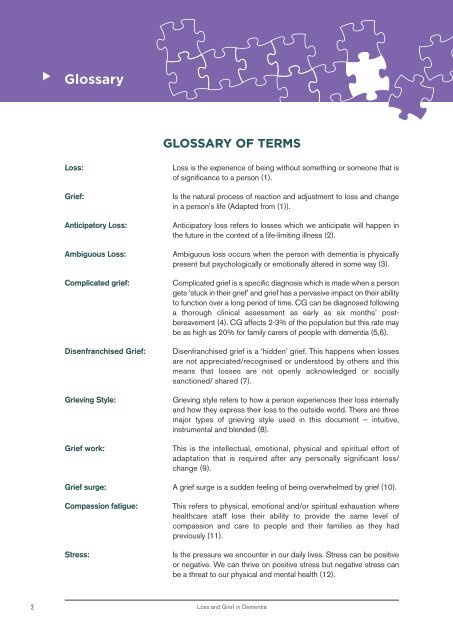Loss and Grief in Dementia
Final-Guidance-Document-3-Loss-Grief
Final-Guidance-Document-3-Loss-Grief
You also want an ePaper? Increase the reach of your titles
YUMPU automatically turns print PDFs into web optimized ePapers that Google loves.
s<br />
Glossary<br />
GLOSSARY Of teRmS<br />
<strong>Loss</strong>:<br />
<strong>Grief</strong>:<br />
Anticipatory <strong>Loss</strong>:<br />
Ambiguous <strong>Loss</strong>:<br />
Complicated grief:<br />
Disenfranchised <strong>Grief</strong>:<br />
Griev<strong>in</strong>g Style:<br />
<strong>Grief</strong> work:<br />
<strong>Loss</strong> is the experience of be<strong>in</strong>g without someth<strong>in</strong>g or someone that is<br />
of significance to a person (1).<br />
Is the natural process of reaction <strong>and</strong> adjustment to loss <strong>and</strong> change<br />
<strong>in</strong> a person’s life (Adapted from (1)).<br />
Anticipatory loss refers to losses which we anticipate will happen <strong>in</strong><br />
the future <strong>in</strong> the context of a life-limit<strong>in</strong>g illness (2).<br />
Ambiguous loss occurs when the person with dementia is physically<br />
present but psychologically or emotionally altered <strong>in</strong> some way (3).<br />
Complicated grief is a specific diagnosis which is made when a person<br />
gets ‘stuck <strong>in</strong> their grief’ <strong>and</strong> grief has a pervasive impact on their ability<br />
to function over a long period of time. CG can be diagnosed follow<strong>in</strong>g<br />
a thorough cl<strong>in</strong>ical assessment as early as six months’ postbereavement<br />
(4). CG affects 2-3% of the population but this rate may<br />
be as high as 20% for family carers of people with dementia (5,6).<br />
Disenfranchised grief is a ‘hidden’ grief. This happens when losses<br />
are not appreciated/recognised or understood by others <strong>and</strong> this<br />
means that losses are not openly acknowledged or socially<br />
sanctioned/ shared (7).<br />
Griev<strong>in</strong>g style refers to how a person experiences their loss <strong>in</strong>ternally<br />
<strong>and</strong> how they express their loss to the outside world. There are three<br />
major types of griev<strong>in</strong>g style used <strong>in</strong> this document – <strong>in</strong>tuitive,<br />
<strong>in</strong>strumental <strong>and</strong> blended (8).<br />
This is the <strong>in</strong>tellectual, emotional, physical <strong>and</strong> spiritual effort of<br />
adaptation that is required after any personally significant loss/<br />
change (9).<br />
<strong>Grief</strong> surge: A grief surge is a sudden feel<strong>in</strong>g of be<strong>in</strong>g overwhelmed by grief (10).<br />
Compassion fatigue:<br />
Stress:<br />
This refers to physical, emotional <strong>and</strong>/or spiritual exhaustion where<br />
healthcare staff lose their ability to provide the same level of<br />
compassion <strong>and</strong> care to people <strong>and</strong> their families as they had<br />
previously (11).<br />
Is the pressure we encounter <strong>in</strong> our daily lives. Stress can be positive<br />
or negative. We can thrive on positive stress but negative stress can<br />
be a threat to our physical <strong>and</strong> mental health (12).<br />
2<br />
<strong>Loss</strong> <strong>and</strong> <strong>Grief</strong> <strong>in</strong> <strong>Dementia</strong>


